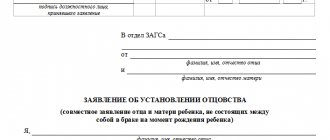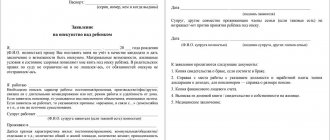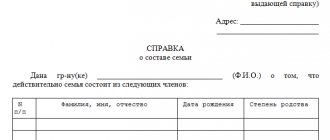Basic Concepts
Property relations between a guardian and a ward are established by law and arise from their legal status.
Ward in st. 2 Federal Law No. 43-FZ of April 24, 2008 is defined as a completely incompetent citizen who is deprived of the right to carry out transactions, dispose of his property and perform duties due to the lack of an objective perception of the environment, assessment of his actions and their possible consequences.
The following were declared incompetent:
- minors (under 14 years old);
- adult citizens in a state of long-term mental disorder, which is an obstacle to an adequate thought process and understanding of reality*.
* - declared as such by the court.
The described category of citizens is considered vulnerable. To ensure normal living conditions and realize their legitimate interests, they need care and support, which is what guardianship embodies. This form of placement of incapacitated persons provides for the appointment of a guardian to a citizen in need - a person who will perform legally significant actions and represent the legitimate interests of his ward.
The decision to appoint a guardian is finally made by the guardianship and trusteeship authority, with the prior consent of the minor or incompetent person in whose direction the guardianship is being issued. In this case, preference is given to:
- Grandparents, adult brothers and sisters of a minor.
- The spouse, adult children, grandparents, brothers, sisters and grandchildren of a disabled person over 18 years of age.
Who is considered a guardian and ward?
Guardianship is established for children aged from birth to 13 years inclusive if their parents are unable or unwilling to care for them. Also, adult citizens who are deprived of legal capacity in court need guardianship. These are individuals who have serious mental disorders and cannot understand the consequences of their actions.
The guardian fully represents the interests of the ward. He carries out transactions on his behalf and accepts inheritance. But rights as a result of his actions arise in the ward.
For example, if a representative enters into an inheritance on behalf of a ward, then the ward acquires ownership of all property.
Guardianship is a form of placement for children aged 14 to 17 years who are left without parental care. And also a way to protect the rights of citizens with limited legal capacity.
The trustee gives the ward consent to conduct transactions, since citizens with limited legal capacity cannot carry them out independently.
What is guardianship
Guardianship is generally understood as a type of family arrangement for minors who have not reached the age of 14 and are left without parental care, as well as a form of ensuring the rights and interests of adults who, due to mental illness, have been declared legally incompetent.
But, despite living in a family, there are no legal ties between the parties to such a relationship that are characteristic of blood family members: their rights and obligations are regulated separately by law.
Guardianship is established by an act of the guardianship and trusteeship authorities, and its conditions, not specified in the law, are fixed by a special agreement. Separately, we note that there are two forms of paid guardianship: foster family and foster care. Despite a number of similarities, they differ significantly from adoption: wards retain their personal data, and guardians are relieved of the obligation to support the wards.
Extracts from inheritance law
The property rights of the deceased can be accepted by his heirs by law or by will.
Succession by law takes place in cases where the testator did not establish otherwise during his lifetime, that is, in the absence of a will. Art. 1142–1145 of the Civil Code of the Russian Federation establishes the circle of possible heirs and the sequence of their calling to inheritance:
- first priority - spouse, parents, children (grandchildren - by right of representation);
- second stage - brothers, sisters (nephews), grandfathers, grandmothers;
- third - aunts and uncles (their children);
- the fourth - parents' grandparents;
- the fifth - grandchildren of brothers and sisters, uncles and aunts of parents;
- sixth - great-grandchildren of brothers and sisters, grandchildren of uncles and aunts, nephews of grandparents;
- the seventh is the legitimate children of the official spouse or, conversely, the official spouse of the legal parent.
A prerequisite for inheritance by relatives is the presence of documentary evidence of their connection with the testator (marriage certificate, birth certificate). Illegalized relationships - civil marriage, lack of official recognition of children by parents or deprivation of their parental rights - are not recognized from a legal point of view, and therefore cannot serve as a basis for succession. A registered relationship with adopted children, on the contrary, equates them to the status of relatives.
However, the entire procedure described can change radically if it is the will of the testator. According to his own considerations and with the support of current legislation, he has the right to assign his property even to a foreign state, depriving his heirs of the established privilege. This is the main difference between the legal and testamentary modes of inheritance.
In law
Since the option with a will is obviously incorrect, all that remains is the procedure for obtaining property according to the law.
The procedure for obtaining property is based on the principle of priority. That is, assets are received in order of proximity of relationship.
The closest relatives are the parents. But since guardianship has been established over the minor, it is obvious that there are no parents. Either they died or were deprived of their rights. This means that they cannot inherit in principle.
The next relatives are grandparents. There cannot be a descending line in age; only an ascending line remains.
Therefore, the assets will go specifically to these relatives. In the absence of such, brothers or sisters will become successors. And their age doesn't matter. Even if they have not reached full legal age, they will be the ones who will gain rights. Of course, all actions will take place through the participation of representatives.
In the absence of the specified relatives, the queue moves, and aunts, uncles, cousins, and so on become successors.
In total, the law provides for seven queues consisting of their relatives. The further the line, the further the relationship with the deceased. But in any case, the assets will go to relatives, even the most distant ones.
Rights of guardians (trustees) to the property of wards (wards)
All rights and obligations of persons appointed as guardians and trustees are provided for in the Civil Code of the Russian Federation (Articles 31-40) and the Federal Law of the Russian Federation “On Guardianship and Trusteeship”.
Paragraph 1 of Article 17 of the Federal Law states that neither guardians (trustees) nor wards (wards) have any rights to each other’s property. The exception is the right to free use of property with the consent of the owner or with the permission of the guardianship and trusteeship authority.
In addition, both legislative acts (clause 1 of Article 21 of the Federal Law of the Russian Federation and clause 2 of Article 37 of the Civil Code of the Russian Federation) provide that without the permission of the guardianship and trusteeship authority, the guardian cannot enter into transactions (and the trustee cannot give permission for transactions) on the alienation of the ward’s property (donation, sale, exchange), about leasing, about transfer on security, about division.
In paragraph 3 of Article 37 of the Civil Code of the Russian Federation, the law deprives guardians (trustees) of the right to enter into transactions with wards (wards), with the exception of the transfer of property to the latter as a gift or free use.
These provisions of the law indicate that the property of the ward (ward), including that received by the latter by inheritance, cannot become the property of the guardian (trustee) and third parties, without the permission of the guardianship and trusteeship authority.
But there is no direct indication in the law about the possibility or impossibility of inheritance. What are the chances of a guardian (trustee) of inheritance after the death of the ward (ward)?
Rights and obligations
The full range of rights and obligations of persons exercising guardianship over citizens of the Russian Federation, regardless of their age, is determined by the provisions of Art. 36 Civil Code and Art. 15 Federal Law “On guardianship and trusteeship”. As for guardianship of minors, the rights and obligations within its framework are determined by Art. 148.1 SK. Summarizing all this, we note that guardians are obliged to:
- live together with the person under guardianship;
- protect his rights and interests;
- take care of the maintenance, provide treatment and care for the ward;
- dispose of the property of the ward in his interests;
- take care of the child’s education, upbringing and all-round development;
- take care of the restoration of legal capacity if it has been lost;
- perform other duties stipulated by the contract.
We invite you to familiarize yourself with: Types and concept of family legal relations under the RF IC
At the same time, the guardian has the right:
- receive remuneration if it is provided for by law and contract;
- restrict the ward's communication with other persons when this is contrary to the interests of the latter;
- independently determine methods of education;
- choose an educational organization and forms of training, and so on.
We recommend that you familiarize yourself with the rights and responsibilities of a guardian in more detail.
Is the guardian of a minor
According to Federal Law No. 48-FZ dated April 24, 2008, guardianship means the form of the device:
- citizens under the age of 14;
- persons declared legally incompetent.
Guardian information:
- appointed by the guardianship and trusteeship authority;
- may be either relatives or strangers to the ward;
- are the legal representatives of the above citizens and are authorized to perform any legally significant actions in their interests;
- transactions with real estate and other property of the ward are carried out by guardians only with the consent of the guardianship authority.
The responsibilities of guardians of minors include:
- caring for the health of the ward;
- protection of his property interests;
- education of minors;
- providing them with education.
Guardianship is appointed over a minor in the event of the death of parents, deprivation of their rights, unknown absence, personal removal from child care, or imprisonment.
A minor child retains his first name, surname, and patronymic.
The state pays monthly funds to the guardian of a minor for the maintenance of the ward citizen. Control over the use of targeted public funds is exercised by the guardianship authority.
Heir of the 1st stage
The guardian of a minor may be a relative or a stranger, including foreign citizens. Restrictions on the appointment of guardians are described in Article 146 of the RF IC.
The procedure for selecting a suitable candidate is enshrined in Government Decree No. 423. Preferential right is given to the child’s relatives in order to preserve blood ties.
Since a minor citizen cannot draw up a will, the guardian cannot become a legal successor by will.
The recipients of the 1st stage are the children, parents, and spouses of the deceased. A minor is placed under guardianship because his mother and father cannot take care of him on their own; he simply does not have other first-degree relatives. Therefore, the guardian of a minor cannot be the primary claimant to the inheritance.
However, if the parents of the ward are deprived of parental rights, then they are unworthy successors. If the legal representative is his brother or sister, then they can become heirs by law.
Heir to the apartment
The child's guardian can claim his apartment only as an heir by law. If guardianship is assigned to a brother or nephew, then in the absence of other recipients, the property will pass to the legal representative.
Lawyer recommends
Guardians can claim the ward's property in two cases - they are close relatives of the testator or under a will. The second option has some features. The order must be drawn up exclusively before guardianship is formalized. Otherwise, it will be declared invalid.
- Due to constant changes in legislation, regulations and judicial practice, sometimes we do not have time to update the information on the site
- In 90% of cases, your legal problem is individual, so independent protection of rights and basic options for resolving the situation may often not be suitable and will only lead to a more complicated process!
Therefore, contact our lawyer for a FREE consultation right now and get rid of problems in the future!
-free for a lawyer!
Ask a legal question and get a free consultation. We will prepare an answer within 5 minutes!
Is the guardian of the person incapacitated?
Guardianship over adult citizens is appointed if they are declared incompetent by a court decision due to a mental disorder. The guardian does not receive payment for the performance of his duties. In most cases, close relatives (children, spouses) become guardians of adult incapacitated citizens.
If the ward is assigned a disability pension, then the legal representative has the right to receive funds and spend them in the interests of the ward.
Can wards use the assets of their guardians? Yes, but only with their consent. Whereas guardians are prohibited from using the property of their wards for personal interests.
heir of the 1st stage
When assigning guardianship to adult citizens, their relatives (parents, spouses, brothers and sisters) have priority rights. According to the law, the guardian can be the heir of the 1st line.
In this case, a brother or sister can be appointed as a guardian. These persons belong to the heirs of the 2nd stage. Guardians do not have any additional preferences due to their status.
However, there is a reason why close relatives did not become guardians. If the children, spouse and parents refuse to care for the incompetent, they may be recognized as unworthy heirs. In this case, the property will be received by the brothers and sisters.
heir to the apartment
The law does not exclude this possibility. For example, if the guardian is a close relative of the ward (spouse, father).
Heirs of the 2nd line can accept the property of the ward under the will. Provided that the document was drawn up long before the registration of guardianship. Also, succession arises in the absence of 1st line applicants.
If there is a will
The administrative document allows you to change the order of inheritance and the composition of applicants for the testator's property. However, there are some limitations. A guardian can assume property rights provided that a will was drawn up in his name before the citizen was declared incompetent. Otherwise, the order will be declared invalid in court.
Whereas the guardian is unlimited in his expression of will. He can freely assign his property to the ward. Naturally, the new guardian or adoptive parent will accept the property in the interests of the ward.
It must be understood that a will represents the last will of the deceased expressed in writing.
This document is often drawn up in the presence of a notary or a person replacing him.
Such rules are designed to exclude unfree expression of will. In this case, the testator must be of sound mind and not show signs of even a temporary mental disorder.
It is the freedom of expression of will and awareness of one’s actions that determine the legality of a will. Meanwhile, guardianship is established over persons no older than 14 years. At this age, children do not even acquire limited legal capacity. They do not have the right to sign documents and do not have the right to independently exercise the rights of the owner in relation to their assets.
This means that the will drawn up by the ward will be obviously invalid. It is void in its essence and cannot entail legal consequences. Moreover, the insignificance of the document is so obvious that it does not require proof. In fact, such a will has no value, being an ordinary paper.
Therefore, it makes no sense to make him a ward. Accordingly, if it is drawn up and the guardians are indicated as successors, the transfer of ownership of the assets will still not occur.
Actions aimed at drawing up a will by guardians in their own interests may be regarded as fraudulent and may result in criminal prosecution.
Art. 159 of the Criminal Code of the Russian Federation
.
Guardian (trustee) and inheritance
As you know, inheritance is possible on two grounds - by will and by law. Let's consider whether a guardian (trustee) can be an heir on one of the grounds.
By will
Yes, a guardian (trustee) can become an heir under a will after the death of the ward (trustee). BUT! Only if a will in his favor was drawn up by an adult before he was declared incompetent (partially capable). After all, as we know, a will drawn up by minors and incompetent persons is invalid. And even the legal representative does not have the right to draw up a will on behalf of the ward (ward).
A guardian (trustee) can draw up a will in favor of the ward (ward), as a result of which the latter will inherit his property.
In law
The law provides for 7 lines of legal heirs who are relatives of the deceased. If the guardian (trustee) is not a relative of the ward (ward) and does not belong to one of the seven lines, he cannot claim inheritance by law. The fact of registration of guardianship (trusteeship) does not give any inheritance rights.
But the ward (ward) has a chance to become an heir after the death of the guardian (trustee). Legal heirs include persons who were dependent on the deceased and/or lived with him for at least 1 year before his death (according to Articles 1142-1148 of the Civil Code of the Russian Federation). Guardians (wards), who were dependents of the guardian (trustee), inherit simultaneously with the legal heirs (see “Obligatory share in the inheritance under a will and by law”).
Exception
It must be said that part of the inheritance after the death of the person under guardianship (ward) can still be received. If the guardian (trustee) has incurred certain financial expenses for managing the inherited property, he has the right to reimbursement of these expenses. Expenses are reimbursed by the guardianship and trusteeship authority from the funds of the deceased.
Results:
- The guardian (trustee) does not have any rights to the property of the ward (ward) and cannot enter into transactions with this property without the permission of the guardianship and trusteeship authority.
- A guardian (trustee) is not considered a legal heir. But he can be an heir under a will if the ward (ward) has drawn up a will in his favor - at the age of majority and full legal capacity.
- Therefore, even if a completely lonely person is under guardianship (trusteeship), after his death the guardian (trustee) cannot claim an inheritance. It will become the property of the state or municipality.
Many people think that guardians cannot claim the inheritance of their wards? However, upon closer examination of the issue, everything is not so clear. The law makes it possible to receive the property of a deceased ward. True, for this you need to take into account many factors. We are talking about kinship, the date of drawing up the will, other heirs, the costs of the guardian, etc.
Guardianship and inheritance
The property of the person under guardianship (if he has died) can be transferred to his guardian by will. The same goes for guardianship. But the document is drawn up by a person at the age of 18 and before the moment when he was declared incompetent (partially or completely). A person who is incapacitated and under 18 years of age cannot make a will. Even his representative does not have such an opportunity. But there are no problems with preparing a will in favor of the ward (ward).
Now let's talk about the inheritance queue. The law provides for seven lines of heirs, all of whom are relatives of the deceased. That is, if the trustee or guardian is not a relative, he is automatically excluded from the list of applicants for the inheritance. In this case, the ward or ward can safely compete for the inheritance after the death of the guardian.
According to the provisions of Art. 1110 of the Civil Code, inheritance is considered to be the transfer of ownership of the testator's property to his heirs in the order of universal succession, that is, in the form in which it was at the time of the death of its owner. According to Art. 1112 of the Civil Code, the inheritance includes all the property that on the day of death belonged to the testator, except for property rights of a personal nature (pension, alimony), as well as non-property rights and intangible benefits.
According to Art. 1111 of the Civil Code, inheritance is carried out on two grounds: by law and by will. It is the basis of inheritance that will determine whether the guardian has the right to the inheritance of the ward after his death. Let's consider these reasons separately.
The will, according to Art. 1118 of the Civil Code, is the only tool with which a citizen is able to dispose of his own property in the event of his death. Provisions of Art. 1119 of the Civil Code guarantee the testator the right to dispose of his own property in favor of anyone, regardless of family composition, family relationships and other aspects - everything depends solely on the will of the testator.
At the same time, the testator is not obliged to report to anyone and justify his will: the only limitation is the right of compulsory share, enshrined in Art. 1149 of the Civil Code, which guarantees a portion of the inheritance to disabled close relatives and dependents.
However, Art. 1118 of the Civil Code defines a number of requirements for the personality of the testator, which give him the right to draw up a will. Thus, at the time of drawing up the document, the testator must be an adult and have full legal capacity. As we know, guardianship cannot be established over such persons.
Therefore, based on such requirements, wards, regardless of the grounds for establishing guardianship over them, do not have the right to draw up a will for the posthumous disposal of property. Despite the status of a legal representative, the guardian also does not have the right to draw up a will on behalf of the ward: according to Part 3 of Art. 1118 of the Civil Code, a will is made exclusively in person.
At the same time, he must be an adult, since guardians cannot a priori inherit from children under their will. Meanwhile, the educators themselves are not at all limited in their right to bequeath property in favor of the ward, so the ward may well receive the status of an heir.
The order of inheritance by law is determined by the provisions of Chapter 63 of the Civil Code. According to Art. 1141 of the Civil Code, heirs by law are called upon to inherit in order of priority: representatives of each subsequent order receive the right to inherit if:
- there are no representatives of previous queues;
- they all refused to accept the inheritance;
- the heirs did not accept the inheritance due to subjective reasons;
- all claimants were excluded from inheritance.
The composition of the subjects who are among the representatives of each queue is determined by the provisions of Art. Art. 1142-1145 and 1148 Civil Code. According to them, inheritance by law provides for 8 lines of inheritance, which include close relatives, family members and disabled dependents of the testator.
Thus, guardians are not included in the list of legal heirs; therefore, guardianship as a form of family structure and upbringing does not give rise to inheritance rights. However, guardians may well be among the relatives of the ward: according to Part 5 of Art. 10 of the Federal Law “On Guardianship and Trusteeship”, adult and capable grandmothers, parents, children, brothers have the priority right to establish guardianship over their relatives.
The persons specified in the article, according to Art. Art. 1142-1144 of the Civil Code, are among the representatives of the first three lines of inheritance, which gives them the right to receive the inheritance of their ward. On a similar basis, wards themselves can inherit from teachers.
Moreover, in some cases, wards can claim the inheritance of their caregivers, even if they were not relatives or family members. Whether the ward is the heir of the guardian depends on the conditions under which the guardianship took place.
Yes, Art. 1148 of the Civil Code equalizes in status the heirs of the line called for inheritance and the disabled dependents of the testator who were his dependents and lived with him for at least one year. Based on this, if guardianship was provided free of charge, and the guardian supported the ward at his own expense for more than a year, the latter can be recognized as a disabled dependent.
Please note that there are cases when a guardian can still receive a part of the property of a deceased ward, but this property will not be considered an inheritance. Thus, if, as part of the performance of his own duties in terms of preserving and managing the property of the ward, he incurred certain expenses, he has the right to demand compensation for such expenses.
Guardians are not the owners of the property of the citizens under their guardianship. Likewise, wards are not the owners of property that belongs to guardians (Article 17 of Federal Law No. 48-FZ). However, guardians and wards can be co-owners of certain property. For example, if the right to common shared ownership arose before the registration of guardianship. At the same time, they can act as heirs of their wards.
We invite you to familiarize yourself with: Receipt for renunciation of inheritance sample
Additionally, the guardian can count on reimbursement of expenses he incurred in connection with the funeral of the ward or protection of the inheritance (Article 1174 of the Civil Code of the Russian Federation). The maximum amount of compensation for the burial of a citizen is 100 thousand rubles. The money is reimbursed from the opened inheritance. Funds can be withdrawn from the bank account ahead of schedule.
Clause 2 art. 17 Federal Law No. 48-FZ allows for the existence of indivisible property owned in certain shares by the guardian and the ward. If its division did not occur during the life of the ward, the guardian has every right to request the allocation of his part after the death of the co-owner. If you have official papers indicating the size or ratio of shares, this will not be difficult to do. It is enough to contact a notary with the appropriate application and title document.
In the case where the individual parts of the common property are not defined, they are considered to be equal. But, if the successors of the ward have complaints about this, they can go to court with the intention of challenging the division carried out and demanding a reduction in the guardian’s share.
The right to part of the property common with the ward does not deprive the guardian of the opportunity to inherit, provided that he belongs to the priority category of heirs.
Does the guardian have the right to inheritance?
The status of a guardian in itself is not a basis for including a citizen performing guardianship functions in the circle of heirs of the ward. This is confirmed by paragraph 1 of Art. 17 Federal Law No. 43-FZ, which denies the right of claim of the parties to guardianship in relation to each other’s property. Moreover, in accordance with paragraph 3 of Art. 37 of the Civil Code of the Russian Federation, transactions concluded with a guardian or members of his family are deprived of legal force. That is, they cannot become heirs under the will. But in practice, everything is not so clear. The representative of the ward appointed by law has the right to become an heir both by law and by will, but subject to certain conditions.
In what cases is succession by will possible?
In order to independently carry out transactions, a citizen requires full legal capacity. The same applies to the right to leave posthumous dispositions regarding one’s property, in other words, to the execution of a will. And the ward, due to his status, cannot carry out such actions. But this restriction is completely lifted with the termination of guardianship due to the recognition of the ward as legally competent based on the following circumstances:
- restoration of the ability to understand and control one’s actions as an adult (requires court confirmation);
- the citizen reaches 18 years of age;
- emancipation of a minor (marriage, employment under an agreement or contract, entrepreneurial activity).
Only in the cases listed above can a fully legally capable testator draw up a legally significant will, including in favor of his former guardian.
Is the guardian a first-degree heir?
If we turn to the procedure of inheritance by law, then the guardian here has much more opportunities to become the legal successor of the person entrusted to him. It all depends on the current queue of heirs and whether he is one of them.
A guardian can become a first-degree heir only in relation to an adult ward if he is his spouse, child or grandchild (in the case where the parents and/or children of the testator have died).
Brothers, sisters, grandfathers, grandmothers who have taken guardianship over their relative have the right to receive his property on the basis of belonging to the second line of inheritance and in the absence of applicants to the first.
Guardians from other categories of relatives can count on inheritance only if they belong to the priority group of heirs - they do not have any advantages over other legal successors.
Adopted children
Adopting a child is a serious step that provides him with many rights at the legal level.
A will can be written for any of the adopted children. This document can be written not only to relatives, but also to completely strangers, even legal entities. And therefore they can inherit according to a will without restrictions.
If there is no will, inheritance occurs according to law, and here the adopted child is completely equal to his own child. For example, if there is one natural child and one adopted child, they inherit 50/50, exactly half.
By not specifying an adopted child in the will, you can disinherit him. But if he is entitled to a compulsory share, it will still be provided to him, even if there is a will in which it is not in it.
The right of a guardian to the property of the ward
The current law does not contain restrictions regarding the receipt by a guardian of movable and immovable things belonging to the ward by inheritance. There is only a requirement that such actions are carried out exclusively with the approval of the relevant government. organs.
Each situation concerning legal relations of inheritance is unique in its own way. Before giving an opinion on an issue of interest, a professional lawyer is obliged to thoroughly study a specific case, including all available documentation. As a result, acquiring the rights to the desired inheritance is possible in only two ways:
- in law;
- by will.
Property rights
Along with rights, the law establishes a number of responsibilities assigned to guardians and trustees. The rules of law introduce prohibitions on the ownership of the property of a person under guardianship by the legal representatives appointed to him. However, there is an exception according to which the use of this property may be allowed to guardians or trustees, but on the basis of the written approval of the guardianship authorities.
Any civil transactions with the property of the ward are carried out only with the participation and control of the guardianship authorities. The latter may deprive the representative of an incapacitated person of the right to perform them, guided by part three of Art. 37 Civil Code of the Russian Federation. This requirement cannot apply to situations in which valuables and objects were donated by the ward to his representative.
Article 37 of the Civil Code of the Russian Federation “Disposition of the property of a ward”
Effect of the will
The inheritance of the ward (in the event of his death) can pass to the trustee on the basis of a previously prepared will. In this case, the document in question must be drawn up by a person whose age is at least 18 years old, and before he was declared incompetent by the court.
It is important to know! A minor citizen, as well as his representative, does not have the right to prepare a will regarding existing property. In contrast, a legal representative can formally bequeath personal property to his or her ward.
It should be noted that the legislator establishes 7 hereditary lines, consisting of relatives of the person who left this world. In other words, if the ward and the trustee are not blood relatives, the latter is not included in the list of heirs.
The situation is mirror opposite in the event of the death of a guardian. Here the ward, referring to Art. Art. 1142-1148 of the Civil Code of the Russian Federation, has the right to claim the property of the deceased (by inheritance), in the case of living together with him for at least 1 year before the date of death.
Special condition
The guardian may have a chance to take ownership of the property of the ward if he can provide the court with evidence indicating the actual investment of personal funds in the management of the specified property of the deceased.
Algorithm for a guardian to inherit an inheritance
In order for the guardian to have a subsequent right to own the inheritance of property left after his ward, the following procedure must be followed:
- Collect the necessary papers that are directly related to property objects (title documents for inherited real estate, etc.) and confirmation of the fact of the connection between the heir and the testator, as well as the untimely death of the ward (kinship document, will, death certificate of a citizen);
- Visit the notary's office located at the place of final residence of the deceased;
- Prepare a written statement regarding the desire to accept the inheritance or provide a certificate of right to it;
- Provide the above application to the notary, attaching a receipt indicating payment of the state fee in the prescribed amount;
- Obtain a title document for the inherited property of the deceased person.
It is important to know! All of the above actions aimed at registering an inheritance are carried out within 6 months from the date of death of the testator. Otherwise, the alleged rights will be automatically revoked and will have to be restored in court.
Actual acceptance of property
It is possible to obtain rights to the desired inheritance without going through the procedure described above. To do this, it is necessary to actually accept the existing property, which is a legal action.
For subsequent recognition of actual succession, the heir must perform any of the following actions:
- Make full or partial payment of the debts of a deceased person;
- Make repairs to the premises intended to be included in the inheritance estate;
- In fact, take care of the inheritance and protect it from external attacks;
- Financially maintain the property.
If, in relation to the above situation, there are no other applicants for the inheritance who have applied to a notary for the purpose of registering it, the heir will still need to justify and prove in court the fact of acceptance of the property.
Restrictions on registration of inheritance for a ward
If the ward is not dependent on the guardian and lives separately from him within 12 months before death, he has no right to claim the existing property.
This prohibition also applies to wards who are not disabled, even if they lived with the deceased for a long period of time.
How can a ward receive the guardian's inheritance?
If the ward's candidacy is included in the list of heirs under the will, or he has the right to allocate a share in the inheritance, to receive the property, you must proceed as follows:
- Collect documents and go to the notary. If a will has been drawn up, the application must be submitted at the place where it was made. If inheritance is carried out according to law, the documents are sent to the place of registration of the testator.
- Payment of the state fee before submitting the application. You will need the appropriate receipt.
- Obtaining a certificate.
If real estate is inherited, it is necessary to register ownership through the MFC or Rosreestr. To register vehicles, you should contact the territorial division of the traffic police.
Below we consider an example of a ward receiving an inheritance:
Omarov N.E. granted guardianship over 12-year-old Efanov V.M. in 2012. All this time, the ward lived with his guardian, who also has an adult son. In 2021 Omarov N.E. dies. At the time of death Efanov V.M. lived with him. There was no will drawn up, therefore, inheritance is carried out according to law. Efanov V.M. can claim a share in the property in the same amount as the biological son of the testator.
In order to receive half the share in the share remaining after Omarov N.E. apartment, the legal representative of the heir turned to the notary with documents and a passport, which indicated that from the moment of registration of guardianship, the ward was registered at the testator's registration address. Until reaching the age of majority, heirs have the right to act only through legal representatives.
After considering the materials after six months, Omarov’s son N.E. and Efanov V.M. two different certificates of the right to inheritance were issued - an apartment. Subsequently, both received extracts from the Unified State Register of Real Estate, where each of them is listed as the owner of 50% of the real estate area.
Documentation
In order for a ward to receive the guardian's inheritance, the following documents will be needed:
- Statement. There is no unified form, but it must contain the name and address of the notary’s office, date of death and full name. the testator, as well as his place of registration; what property remained after him for inheritance; request for a certificate; signature and date of preparation.
- Certificate of death of the testator.
- Certificate of guardianship.
- Certificate of deregistration. Issued by the territorial Department of Internal Affairs of the Ministry of Internal Affairs.
- A certificate of ownership or other title document indicating that the property belongs to the testator.
- Valuation report (if a property valuation is required to determine the notary fee).
- Certificate of disability (needed to confirm incapacity for work). Issued through ITU.
- Technical documentation for real estate.
- Will (if one has been drawn up).
- Court decision recognizing the testator as deceased (if issued).
It will take several weeks to review the documents. During the process, the notary may ask for additional materials. An inheritance certificate is issued after six months from the date of death of the testator: this time is needed so that other legal successors can also receive the property. After six months, those who have not entered into an inheritance will be able to do so only through the court.
When is it impossible to register an inheritance for a person under guardianship?
If the ward was not a dependent and did not live with the guardian for 12 months before his death, he will not be able to receive an inheritance. This also includes wards who are not disabled: even if completely healthy citizens lived with the testators for a long time, they do not have the right to claim property.
How can a guardian register an inheritance?
Registration of a guardian's inheritance is no different from the procedure performed by an ordinary heir. A person collects documents indicating the right of inheritance: a will, a death certificate, a document on kinship, etc.
After this, the heir goes with the documents to the notary and writes a statement that he wishes to enter into the inheritance. He pays the state fee and receives a certificate of receipt of the inheritance.
All this must be done within six months after the death of the testator, otherwise you may lose this precious right. Even if there are problems in obtaining documents, it is better to go to a notary and submit an application.
The division of inheritance or assignment in favor of one person can be resolved peacefully. But in any case, the actual heir-guardian, even if he received a will, will most likely have to defend his right in court.
Having entered into actual inheritance of property, the heir becomes its owner. He will have to pay off the debts of the testator, pay for the maintenance of the property (utilities, electricity, etc.), manage the property, preserve and protect it.
The right to own common property
There are also indivisible items of property that belong in certain shares simultaneously to both the legal representative and the ward. If at the time of the death of the ward there was no division of such property, the guardian has the right to claim the allocation of his part to him.
Proof of the existence of these legal relations are official documents confirming the ratio of shares of the parties. These papers, with the corresponding written request, must be provided to the notary.
In situations in which the property shares of the parties in common property are not determined, they are considered equal. This circumstance can only be challenged in court.
Disposal of property
There is a certain set of rules regarding the possibility of disposing of the property of a ward during his lifetime. Guardians largely control the activities of their wards, and in particular, any transactions go through them.
But they cannot act in their own interests when disposing of property - all transactions must take place only in the interests of the ward. Transactions are controlled by the guardianship authorities, to whom these people report, prior permission is always necessary. And therefore, it will not be possible to simply transfer the property to yourself; this is a completely illegal action.








